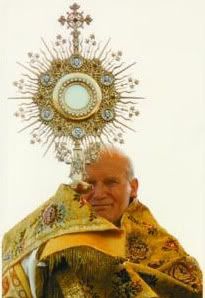Thoughts on Reformation Day
To celebrate Reformation Sunday, the PCA church back home sings "A Mighty Fortress Is Our God" (shh...don't tell Paul, but I am really quite fond of this hymn, even if it was written by a heretic) and hangs up banners with Protestant slogans written in bad Latin ("Sola Christo"). After church they mill around and drink the same weak coffee they have every Sunday.
To celebrate the Feast of St. Jude, on Friday we had two hours of Eucharistic Adoration after mass, followed by a Vespers service. Yesterday, the Knights of Columbus color corps attended in full regalia, and after mass we had punch and chocolate cake in addition to the muffins, sweet breads, juice, and coffee we have every Sunday.
When one delves into this point a little bit, one recognizes some interesting patterns. In short, Protestantism is based upon death and division, while Catholicism is based upon life. This is reflected in the fact that Catholic cultures are the only ones that know how to have fun without falling into hedonism (think "really good party" and the Italians, Irish, and Spaniards pop into your mind, not the Swedes, Prussians, and Saudis). Catholics are also the only people who manage to celebrate the sacred with ritual without falling into paganism. Thus, one comes back to the Chestertonian notion of the Church existing to make people happy, because people are happy, by definition, when they live in the Truth. Reformation Day is a celebration of a negative, a division, a fundamentally sterile act. The feast of St. Jude, however, is a celebration of life, propagation, and the dedication of man to the love of God.
It should come as no surprise, then, to find that the remembrance of the one is (at best) a lukewarm occasion, while the other is a joyous occasion on which even a small parish community like St. Jude's breaks out an array of Catholic cultural elements, which fit seamlessly into the rites and doctrines that they have developed alongside. The former fails to "fit" because it attempts to celebrate something that is inherently un-celebratable. The latter succeeds because it revels in God's glory in the Church, the Blessed Sacrament, and in the temporally and spiritually interconnected communion of believers.
File Under: Catholic_Stuff








0 Comments:
Post a Comment
<< Home